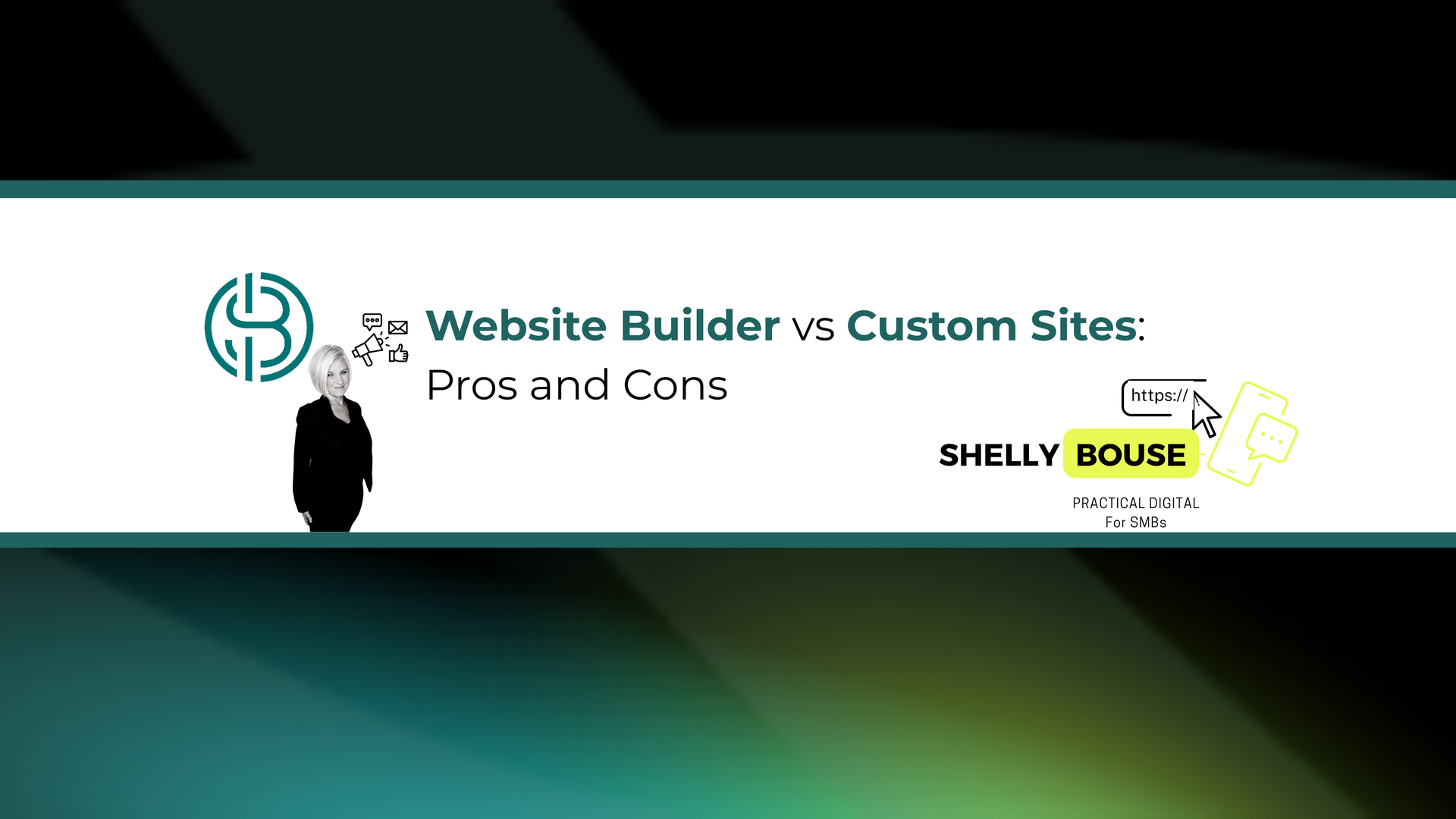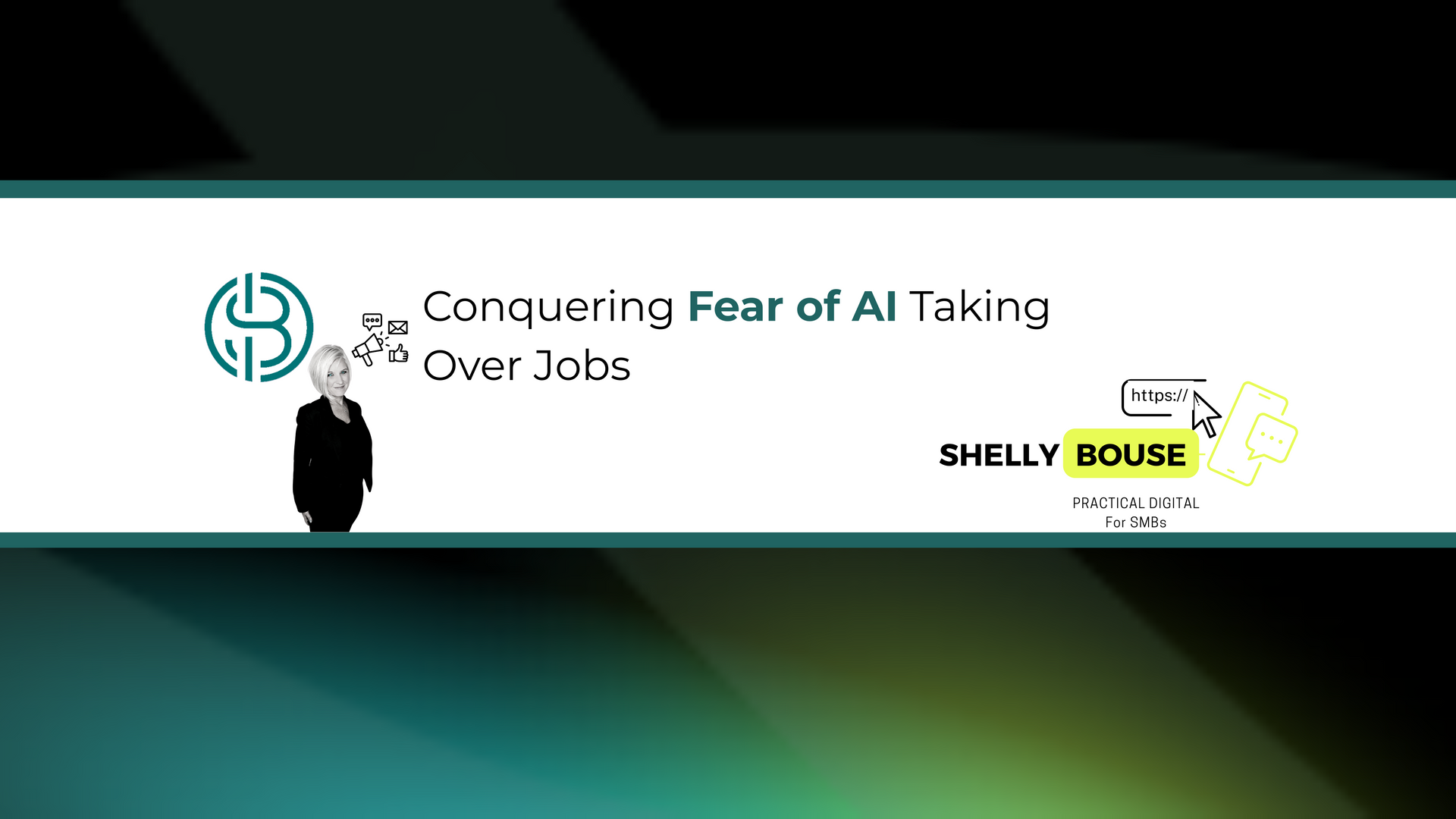SEO's Power Unleashed: Your Roadmap to Success
Shelly Bouse • April 14, 2025
Utilizing the Power of SEO: A Roadmap to Achieving Success
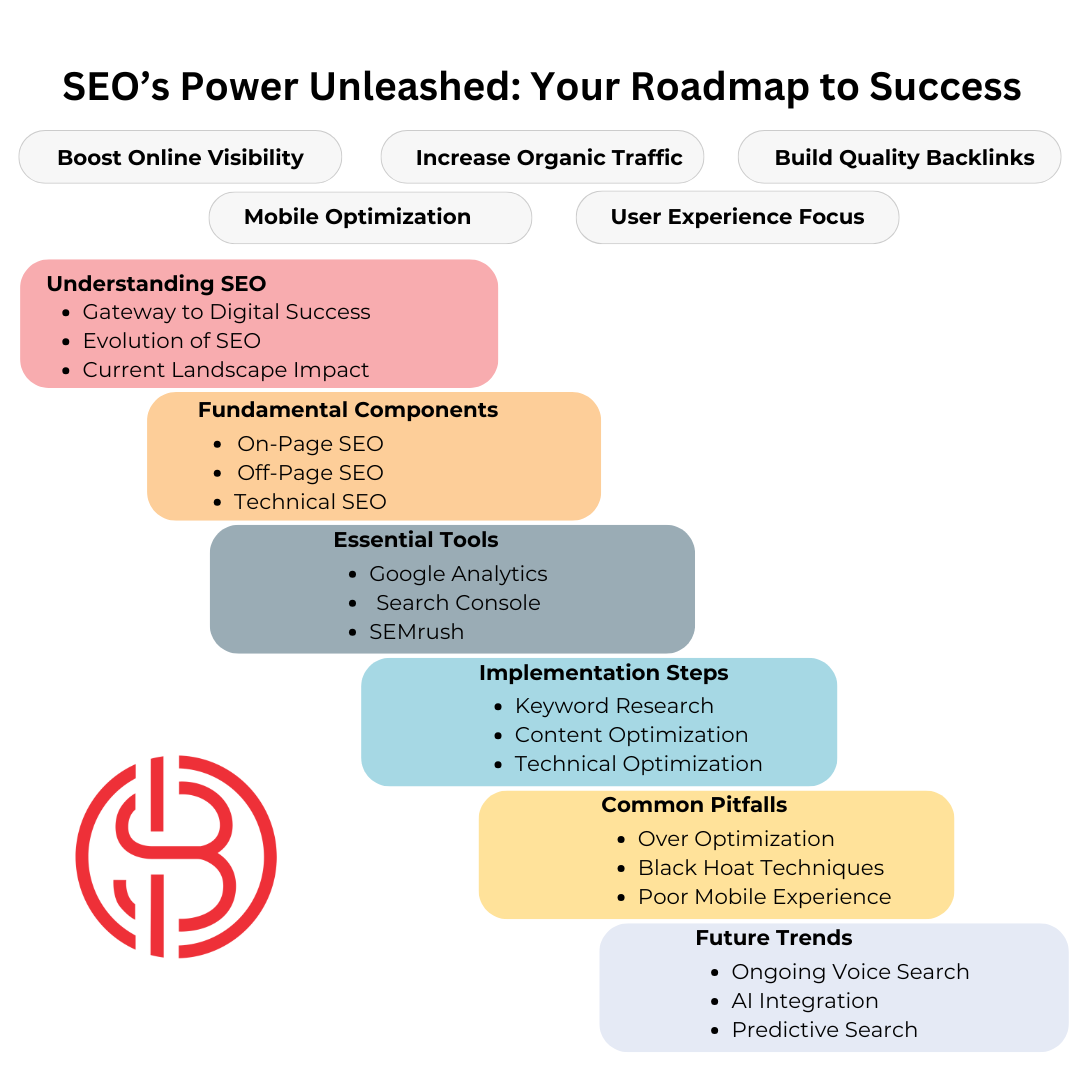
Key Highlights
- This blog is a helpful guide for understanding and using SEO strategies. Its goal is to improve the visibility of your website and increase organic traffic.
- It provides a clear path that begins with the basics of SEO . After that, it covers advanced techniques and future trends.
- Each step is easy and actionable, making it simple for beginners to understand and put into practice.
- The blog points out common mistakes to avoid. This way, readers can steer clear of errors that could harm their SEO efforts.
- Real-life success stories show how different websites have effectively used SEO. These examples offer inspiration and useful ideas.
- It also suggests resources and communities for further learning. This encourages a mindset of continuous growth in the changing SEO world.
Understanding SEO: The Gateway to Digital Success
Search Engine Optimization
, known as SEO, helps make your website and its content better. The main goal is to boost your ranking in search engine results pages, known as SERPs. This means you want your site to catch the eye of search engines like Google. When you succeed, your website shows up as a top result when people search using specific
keywords
.
When your site has a higher ranking, more people can find it. This leads to more organic traffic. As a result, you can reach more potential customers. This increase helps raise brand awareness and leads to more conversions.
In today’s challenging online world, SEO is crucial. Many websites want attention. Getting to the first page of Google search is essential for success. A well-built website attracts the right visitors. This boosts the chances of turning them into customers.
SEO is not just a trick to trick the system. It is about aligning your website with what Google considers valuable: a great user experience. This means you need to create quality content that meets user intent. Additionally, you should ensure that your site loads quickly and is easy to use. SEO is all about creating a website that people like and that search engines can trust. When you achieve this, you can boost your online presence and meet your business goals.
The SEO industry has changed a lot over the years. In the past, it was all about keyword stuffing and link schemes. Now, it is a smart part of digital marketing. It values user experience and quality content.
Search engines are becoming smarter. They use advanced programs software programs like SEMrush to determine organic results. This is based on what users want and how happy they feel. Because of this, SEO strategies must adapt. They should focus on long-tail keywords, use natural language, and provide useful information that answers what users ask.
Today, SEO is an ongoing task. It means improving, studying, and changing our strategies. It is essential to stay updated with new algorithm changes, industry trends, and how users behave. This is critical for doing well in the ever-evolving field of search engine marketing.
When your site has a higher ranking, more people can find it. This leads to more organic traffic. As a result, you can reach more potential customers. This increase helps raise brand awareness and leads to more conversions.
The essence of SEO in today's digital landscape
In today’s challenging online world, SEO is crucial. Many websites want attention. Getting to the first page of Google search is essential for success. A well-built website attracts the right visitors. This boosts the chances of turning them into customers.
SEO is not just a trick to trick the system. It is about aligning your website with what Google considers valuable: a great user experience. This means you need to create quality content that meets user intent. Additionally, you should ensure that your site loads quickly and is easy to use. SEO is all about creating a website that people like and that search engines can trust. When you achieve this, you can boost your online presence and meet your business goals.
How SEO has evolved over the years
The SEO industry has changed a lot over the years. In the past, it was all about keyword stuffing and link schemes. Now, it is a smart part of digital marketing. It values user experience and quality content.
Search engines are becoming smarter. They use advanced programs software programs like SEMrush to determine organic results. This is based on what users want and how happy they feel. Because of this, SEO strategies must adapt. They should focus on long-tail keywords, use natural language, and provide useful information that answers what users ask.
Today, SEO is an ongoing task. It means improving, studying, and changing our strategies. It is essential to stay updated with new algorithm changes, industry trends, and how users behave. This is critical for doing well in the ever-evolving field of search engine marketing.
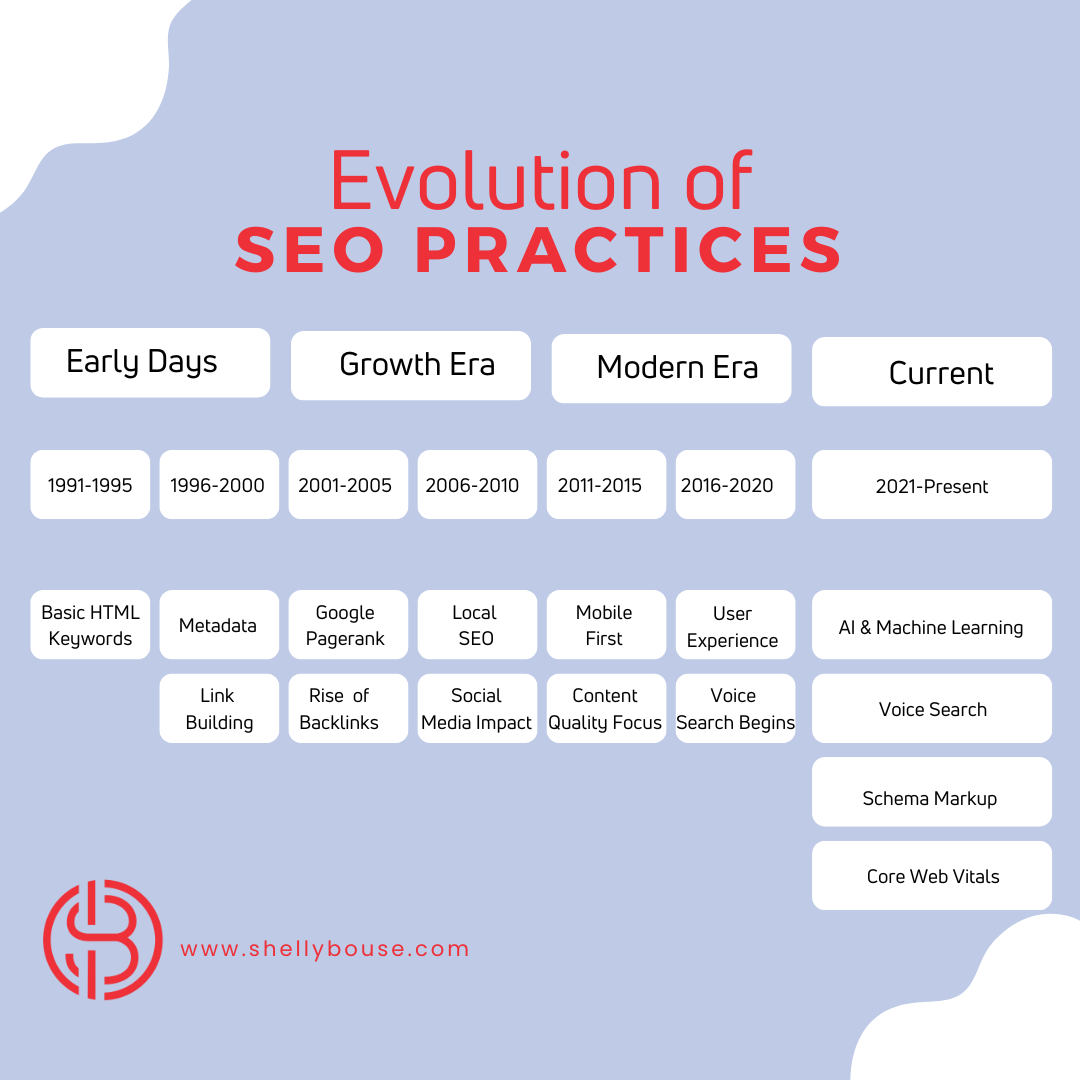
The Fundamental Components of SEO
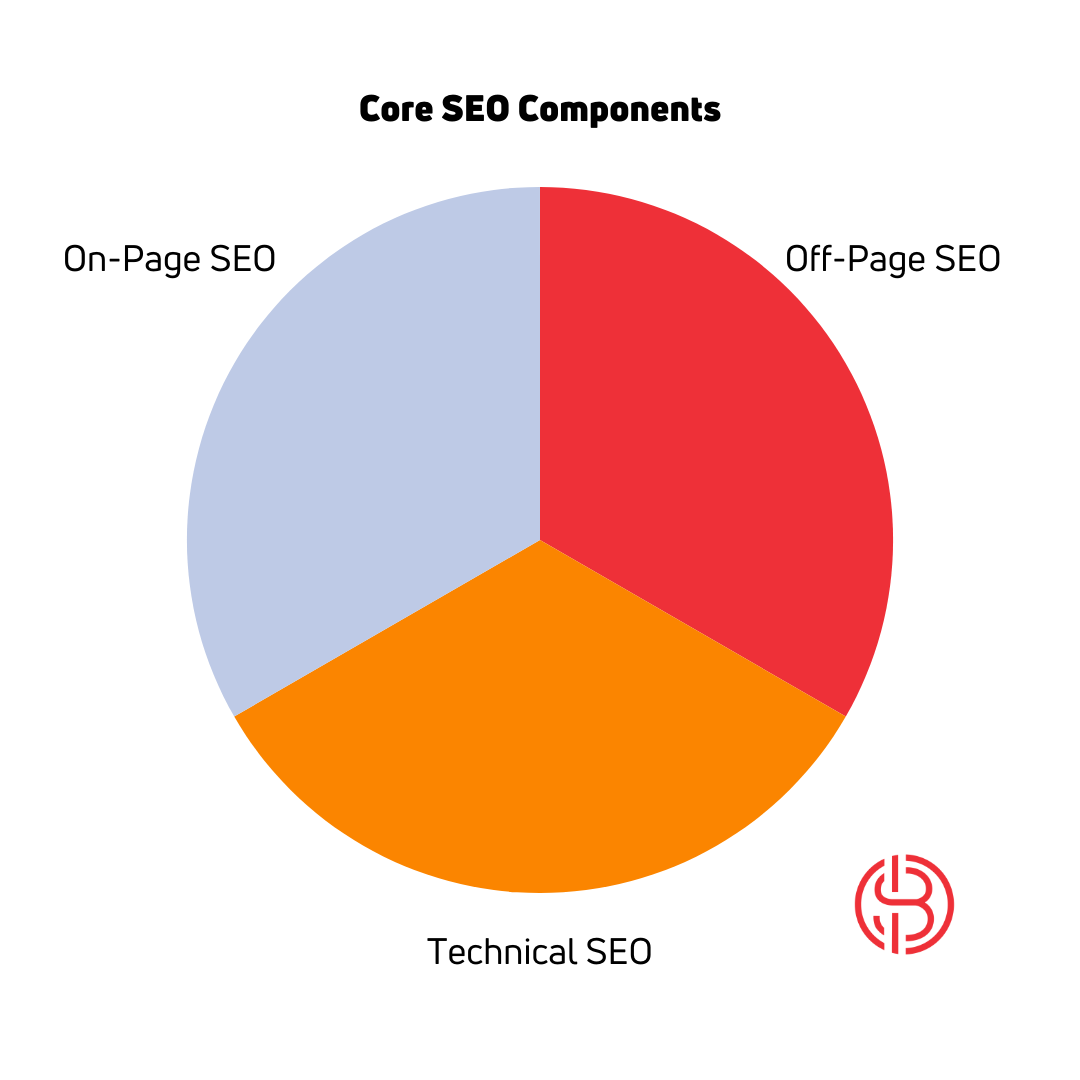
SEO includes several parts that help your website get more visibility. We can break these parts down into three main types: on-page SEO, technical SEO, and off-page SEO.
On-page SEO works by adjusting the website content and HTML code so they fit target keywords and are simple for users to read. Technical SEO is about improving things that happen behind the scenes. This includes speeding up the site, making it friendly for mobile devices, and boosting its overall performance. These steps help search engines discover and index your website easier. Off-page SEO is about gaining more trust and visibility for your site. This is done through actions like getting backlinks and participating on social media.
On-page SEO is about making changes to your website so it ranks higher and gives a better experience to visitors. This involves using the right keywords in your text. The most important thing is to create quality content that truly connects with your target audience.
Good keyword research is very important for on-page SEO. If you understand what your audience wants, you can use the right keywords on your website. You should include them in your text, headlines, meta descriptions, and image alt tags.
Remember, making your keywords better should not make your content tough to read. If you write content that is helpful, interesting, and valuable, people will stay on your page longer. This shows search engines that you provide a good user experience.
Technical SEO is crucial for the back-end of your website. It ensures that everything runs smoothly, which enhances user experience. It also helps search engines find your site more easily. You need to adjust your website's code and structure to meet the best practices in technical SEO. By doing this, you can boost your website traffic and improve its ranking.
One important part of technical SEO is the speed of your site. If your pages load slowly, users may feel frustrated and leave quickly. This can hurt your SEO. To make your site faster, you can focus on several things. You can work on images, use browser caching, and speed up the server response time. These changes will help create a better user experience.
Being mobile-friendly is very important. A lot of people use their phones to look online. Your website should work well on all screen sizes. By paying attention to these core web vitals, you can boost your technical SEO. This can help your site get higher rankings and more organic traffic.
Off-page SEO means doing things outside your website to help it rank better in search engines. It aims to boost your site's authority and reputation in your area. You can improve this by building links, engaging on social media, and using other strategies.
Backlinks are links that come from other websites to your website. They matter a lot for off-page SEO. Backlinks help search engines see that your content is good and trustworthy. When you receive high-quality backlinks from respected websites in your area, it can boost your organic traffic and improve your website's authority. Social media does not directly change your Google rankings. However, it can help build a strong online presence and grow your brand's reach. Sharing interesting content on platforms like Facebook, Twitter, and LinkedIn can lead to new backlinks. This can also bring in traffic from other sites and help boost your organic search visibility.
On-page SEO works by adjusting the website content and HTML code so they fit target keywords and are simple for users to read. Technical SEO is about improving things that happen behind the scenes. This includes speeding up the site, making it friendly for mobile devices, and boosting its overall performance. These steps help search engines discover and index your website easier. Off-page SEO is about gaining more trust and visibility for your site. This is done through actions like getting backlinks and participating on social media.
Breaking down on-page SEO: Content quality and keyword optimization
On-page SEO is about making changes to your website so it ranks higher and gives a better experience to visitors. This involves using the right keywords in your text. The most important thing is to create quality content that truly connects with your target audience.
Good keyword research is very important for on-page SEO. If you understand what your audience wants, you can use the right keywords on your website. You should include them in your text, headlines, meta descriptions, and image alt tags.
Remember, making your keywords better should not make your content tough to read. If you write content that is helpful, interesting, and valuable, people will stay on your page longer. This shows search engines that you provide a good user experience.
Technical SEO demystified: Site speed and mobile-friendliness
Technical SEO is crucial for the back-end of your website. It ensures that everything runs smoothly, which enhances user experience. It also helps search engines find your site more easily. You need to adjust your website's code and structure to meet the best practices in technical SEO. By doing this, you can boost your website traffic and improve its ranking.
One important part of technical SEO is the speed of your site. If your pages load slowly, users may feel frustrated and leave quickly. This can hurt your SEO. To make your site faster, you can focus on several things. You can work on images, use browser caching, and speed up the server response time. These changes will help create a better user experience.
Being mobile-friendly is very important. A lot of people use their phones to look online. Your website should work well on all screen sizes. By paying attention to these core web vitals, you can boost your technical SEO. This can help your site get higher rankings and more organic traffic.
The power of off-page SEO: Backlinks and social signals
Off-page SEO means doing things outside your website to help it rank better in search engines. It aims to boost your site's authority and reputation in your area. You can improve this by building links, engaging on social media, and using other strategies.
Backlinks are links that come from other websites to your website. They matter a lot for off-page SEO. Backlinks help search engines see that your content is good and trustworthy. When you receive high-quality backlinks from respected websites in your area, it can boost your organic traffic and improve your website's authority. Social media does not directly change your Google rankings. However, it can help build a strong online presence and grow your brand's reach. Sharing interesting content on platforms like Facebook, Twitter, and LinkedIn can lead to new backlinks. This can also bring in traffic from other sites and help boost your organic search visibility.
Preparing for SEO Success: What You Need to Get Started
Starting your SEO journey can feel like a big task. However, using the right tools and resources can make it easier. There are many free and paid tools that can assist you. These tools can help with keyword research, checking your website, analyzing your competitors, and more.
It is important to know your target audience and market. You need to identify who your ideal customer is. Check what your competitors are doing. Discover the right keywords in your area. This will help you create a successful SEO plan.
Navigating SEO can be hard, especially for beginners. Luckily, there are many SEO tools available. These tools can help make things easier and provide useful tips. Here are some key resources to help you on your SEO journey:
Using these helpful tools will let you see how well your website is doing. You can find ways to get better and keep an eye on your progress as time goes on.
Having the right SEO tools is very important. But it is also very important to know your target audience and market competition. This information is key to building a good digital marketing strategy. It supports your SEO work . It helps you create campaigns that reach the people you want.
Begin by describing your perfect customer. What is their age? Where do they live? What do they like? What problems do they have? What are they trying to find online? When you know your target audience well, you can tailor your content to match their search intent. This method will help you get more engagement and improve conversion rates.
Checking what your competitors do for SEO can help you a lot. Look for the keywords they rank highest for, their backlinks, and how they create content. This will show you what is successful for them. You can also find ways to get a bigger part of the market.
It is important to know your target audience and market. You need to identify who your ideal customer is. Check what your competitors are doing. Discover the right keywords in your area. This will help you create a successful SEO plan.
Essential tools and resources for beginners
Navigating SEO can be hard, especially for beginners. Luckily, there are many SEO tools available. These tools can help make things easier and provide useful tips. Here are some key resources to help you on your SEO journey:
- Google Analytics: This free tool provides a lot of info about your website traffic and how users behave. It helps you see what works and what doesn’t. You can then decide where to put your SEO efforts.
- Google Search Console: This is a free tool from Google that lets you check how your website performs in Google Search results. You can find crawl errors, submit sitemaps, analyze search queries, and more problems.
- Semrush: Semrush is a complete SEO toolkit. It has tools for keyword research, competitor analysis, site audits, backlink tracking, and other features. This makes it helpful for both new and experienced SEO users.
Using these helpful tools will let you see how well your website is doing. You can find ways to get better and keep an eye on your progress as time goes on.
Understanding your audience and market
Having the right SEO tools is very important. But it is also very important to know your target audience and market competition. This information is key to building a good digital marketing strategy. It supports your SEO work . It helps you create campaigns that reach the people you want.
Begin by describing your perfect customer. What is their age? Where do they live? What do they like? What problems do they have? What are they trying to find online? When you know your target audience well, you can tailor your content to match their search intent. This method will help you get more engagement and improve conversion rates.
Checking what your competitors do for SEO can help you a lot. Look for the keywords they rank highest for, their backlinks, and how they create content. This will show you what is successful for them. You can also find ways to get a bigger part of the market.
A Step-by-Step Guide to Implementing Effective SEO Strategies
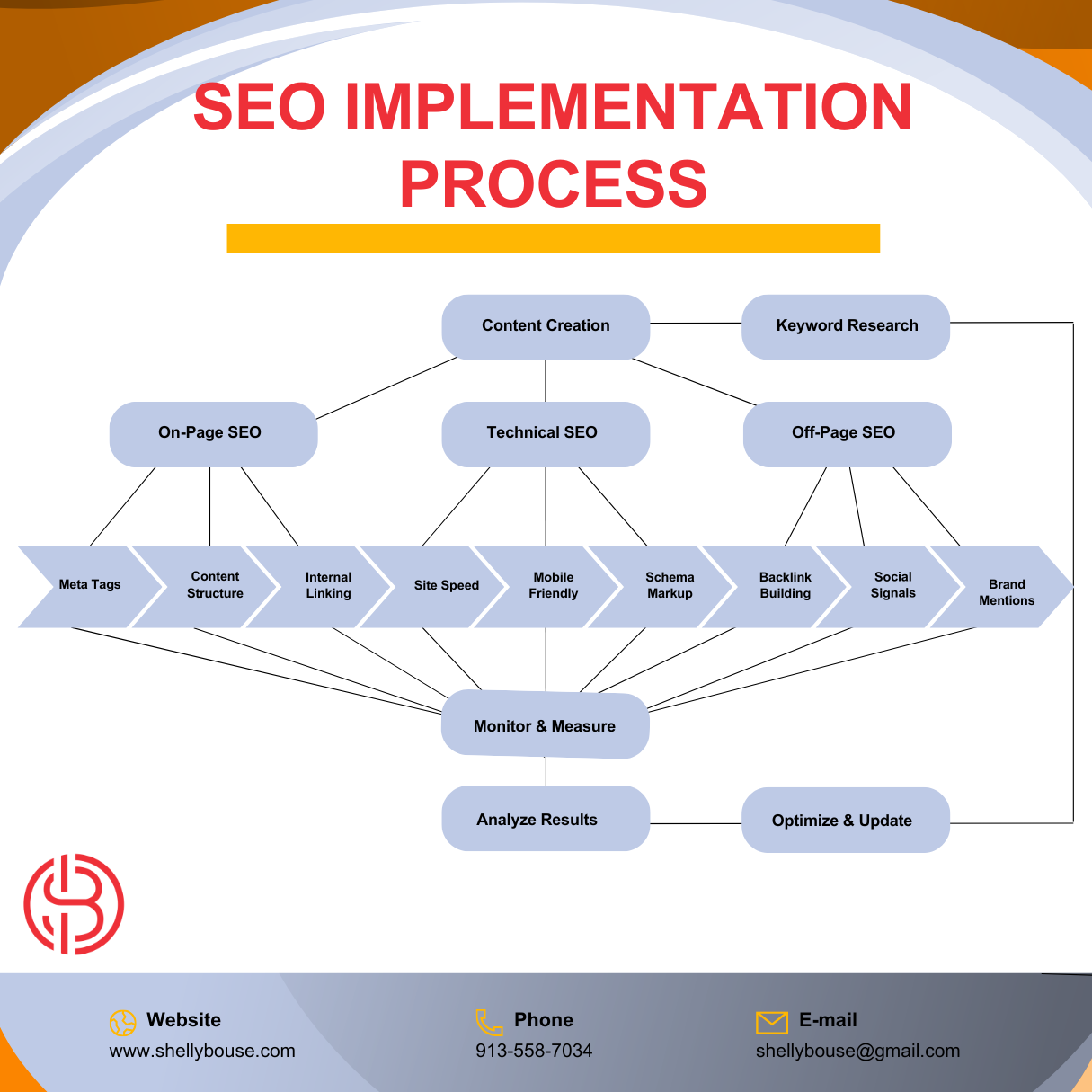
Now that you understand the basics of SEO and the main tools, let’s make the steps easier to practice. This guide will show you the key steps to create and follow a good SEO strategy.
SEO is not a one-time job. You need to update, check, and change it regularly. This way, it can keep being successful.
Keyword research is very important for a good SEO strategy. It involves finding the words and phrases that your target audience uses to search for information about what you offer. When you know what people want, and you create content that matches their search queries, you can connect with them better. This helps improve your website's visibility.
Many tools for keyword research, both free and paid, can help you. These tools provide key data on how often people search for keywords, how much competition there is, and how important the keywords are. This information helps you pick keywords that can have a strong effect. You can use these tools to find relevant terms, see what your competitors are using, and find long-tail keywords. These long-tail keywords often have less competition and clear user intent.
Picking the right keywords is not just about throwing a lot into your content. It is important to use them in a way that feels natural. This helps search engines find your content. It also makes it more valuable for your target audience.
Once you create a solid keyword plan, the next step is to produce quality content. This content should rank well in search engines and engage your target audience. Here is where content marketing and SEO work together. They help you attract organic traffic and meet your digital marketing goals.
Creating valuable content is about more than just using keywords. You should give informative, relevant, and engaging materials that match what users want and answer their questions. This can be helpful blog posts, exciting videos, or clear product descriptions. Make sure your content truly enhances the user experience.
On-page optimization is everything you do on your website to make it more visible and easier for users to find their way around. This means enhancing each webpage to score higher for specific keywords. It also involves providing helpful content that attracts your target audience. Using keywords the right way is very important for on-page SEO. Put your main keywords in your page title, headings, meta descriptions, and text naturally. Don't stuff your content with too many keywords. This can hurt your ranking.
It is important to improve your site structure and internal links. A website that is well organized with easy navigation helps both users and search engines find the information they need. This improves user experience and can boost your search ranking.
Technical optimization ensures your website functions properly for SEO behind the scenes. This involves fixing key technical issues on your site. Doing this makes it simpler for search engines to find and understand your site. It also improves the experience for users.
One important part of technical optimization is site speed. A website that takes a long time to load can irritate users. Many might leave the site quickly. This can hurt your SEO ranking. To help your website load faster, you can make your image sizes smaller, use browser caching, and choose a reliable hosting provider. Doing these things can improve load times and give users a better experience.
Mobile-friendliness is very important today. You need to make sure your website looks good on all devices and screen sizes. This helps users have a good experience, no matter how they visit your site. A mobile-friendly website can make users happy and can improve your search engine ranking.
Building good backlinks matters a lot for off-page SEO. They help boost your organic search ranking. Backlinks are links from other sites that connect to yours. They tell search engines that your website content is valuable and deserves trust.
To build links well, you should get backlinks from popular and related websites in your area. A few good ways to earn quality backlinks are guest blogging, fixing broken links, and getting links from resource pages. It is key to connect with other website owners and create valuable content. This type of content can attract backlinks on its own.
Not every backlink is good for you. Links from poor or low-quality websites can damage your SEO. It’s important to aim for quality links instead of just collecting many. Make sure to check your backlink profile often. This way, you can spot and remove any bad links that might harm your SEO work.
Analyzing your SEO performance is very important. It shows you what works and what doesn’t. Then, you can make changes to improve over time. By checking your SEO regularly, you will learn useful information about your website traffic. You will see how users act and how easy it is to find you in searches. This can help you change your strategies for better results.
You can use tools like Google Analytics and Google Search Console to help you with this. Google Analytics lets you see where your website traffic comes from. It shows you who your users are and how many people leave without doing anything. It also tracks your conversion goals. Look at your organic search traffic too. This will show you which keywords bring visitors to your site. With this information, you can improve pages that are not doing well and find new ways to enhance your site.
Google Search Console helps you see how well your website is doing on Google Search. You can check your click-through rate (CTR) for different keywords, spot crawl errors, and look at your backlinks. By looking at these numbers regularly, you can understand your SEO performance better. This helps you make smart choices to boost your website's visibility and meet your business goals.
Step 1: Keyword research and selection
Keyword research is very important for a good SEO strategy. It involves finding the words and phrases that your target audience uses to search for information about what you offer. When you know what people want, and you create content that matches their search queries, you can connect with them better. This helps improve your website's visibility.
Many tools for keyword research, both free and paid, can help you. These tools provide key data on how often people search for keywords, how much competition there is, and how important the keywords are. This information helps you pick keywords that can have a strong effect. You can use these tools to find relevant terms, see what your competitors are using, and find long-tail keywords. These long-tail keywords often have less competition and clear user intent.
Picking the right keywords is not just about throwing a lot into your content. It is important to use them in a way that feels natural. This helps search engines find your content. It also makes it more valuable for your target audience.
Step 2: Creating compelling content that ranks
Once you create a solid keyword plan, the next step is to produce quality content. This content should rank well in search engines and engage your target audience. Here is where content marketing and SEO work together. They help you attract organic traffic and meet your digital marketing goals.
Creating valuable content is about more than just using keywords. You should give informative, relevant, and engaging materials that match what users want and answer their questions. This can be helpful blog posts, exciting videos, or clear product descriptions. Make sure your content truly enhances the user experience.
- Always aim for readability and clarity.
- Break hard topics into smaller parts.
- Use images and visuals to engage people.
- Make sure your content works well on mobile devices.
- Creating great content keeps users on your page for longer.
- A good browsing experience can help boost your search ranking.
Step 3: On-page optimization techniques
On-page optimization is everything you do on your website to make it more visible and easier for users to find their way around. This means enhancing each webpage to score higher for specific keywords. It also involves providing helpful content that attracts your target audience. Using keywords the right way is very important for on-page SEO. Put your main keywords in your page title, headings, meta descriptions, and text naturally. Don't stuff your content with too many keywords. This can hurt your ranking.
It is important to improve your site structure and internal links. A website that is well organized with easy navigation helps both users and search engines find the information they need. This improves user experience and can boost your search ranking.
Step 4: Enhancing website technicalities for SEO
Technical optimization ensures your website functions properly for SEO behind the scenes. This involves fixing key technical issues on your site. Doing this makes it simpler for search engines to find and understand your site. It also improves the experience for users.
One important part of technical optimization is site speed. A website that takes a long time to load can irritate users. Many might leave the site quickly. This can hurt your SEO ranking. To help your website load faster, you can make your image sizes smaller, use browser caching, and choose a reliable hosting provider. Doing these things can improve load times and give users a better experience.
Mobile-friendliness is very important today. You need to make sure your website looks good on all devices and screen sizes. This helps users have a good experience, no matter how they visit your site. A mobile-friendly website can make users happy and can improve your search engine ranking.
Step 5: Building quality backlinks
Building good backlinks matters a lot for off-page SEO. They help boost your organic search ranking. Backlinks are links from other sites that connect to yours. They tell search engines that your website content is valuable and deserves trust.
To build links well, you should get backlinks from popular and related websites in your area. A few good ways to earn quality backlinks are guest blogging, fixing broken links, and getting links from resource pages. It is key to connect with other website owners and create valuable content. This type of content can attract backlinks on its own.
Not every backlink is good for you. Links from poor or low-quality websites can damage your SEO. It’s important to aim for quality links instead of just collecting many. Make sure to check your backlink profile often. This way, you can spot and remove any bad links that might harm your SEO work.
Step 6: Measuring and analyzing SEO performance
Analyzing your SEO performance is very important. It shows you what works and what doesn’t. Then, you can make changes to improve over time. By checking your SEO regularly, you will learn useful information about your website traffic. You will see how users act and how easy it is to find you in searches. This can help you change your strategies for better results.
You can use tools like Google Analytics and Google Search Console to help you with this. Google Analytics lets you see where your website traffic comes from. It shows you who your users are and how many people leave without doing anything. It also tracks your conversion goals. Look at your organic search traffic too. This will show you which keywords bring visitors to your site. With this information, you can improve pages that are not doing well and find new ways to enhance your site.
Google Search Console helps you see how well your website is doing on Google Search. You can check your click-through rate (CTR) for different keywords, spot crawl errors, and look at your backlinks. By looking at these numbers regularly, you can understand your SEO performance better. This helps you make smart choices to boost your website's visibility and meet your business goals.
Advanced SEO Techniques for Further Growth
Once you have a good understanding of basic SEO, you can start finding better ways to make your website stand out. This will help you get more organic traffic. You need to stay updated with new changes. It is important to adapt and use new tools to stay ahead of your competition.
Using schema markup can help you get better visibility. Learning how AI and machine learning work in SEO is also important. Trying these advanced techniques can help you improve your strategies. This way, you can find more success.
Schema markup is a type of microdata. It gives search engines more information about your website content. This helps them understand your pages better. This, in turn, can improve how your site shows up in search engine results. By using schema markup, you can make your website stand out. This can lead to more clicks through rich snippets and SERP features.
Think of schema markup as a way to communicate with search engines in their own language. It provides information about your content. This includes details about products, services, events, reviews, recipes, and more. When you organize this information for search engines, your search listings become more accurate and relevant.
Using schema markup can help your website get more clicks. It can make your site stand out from others with better search results. This tool can turn your website into a trusted source of information. As a result, you can see more visibility and growth in website traffic.
Artificial intelligence (AI) and machine learning are changing the online world fast. Search engines use AI to learn what people want. They study how users act and give better results. Marketers need to change their plans to keep up with these changes.
Machine learning is a branch of AI. It helps search engines learn from a lot of data and get better over time. This means that SEO strategies can't simply be created and left alone. They have to change as search engine behavior and user needs change.
If you understand how AI and machine learning change search marketing, you can get better at keyword research. This knowledge helps you optimize your content for voice search. You can also offer personalized experiences for users and keep up with the fast-changing world of search engine optimization.
Leveraging schema markup for better visibility
Schema markup is a type of microdata. It gives search engines more information about your website content. This helps them understand your pages better. This, in turn, can improve how your site shows up in search engine results. By using schema markup, you can make your website stand out. This can lead to more clicks through rich snippets and SERP features.
Think of schema markup as a way to communicate with search engines in their own language. It provides information about your content. This includes details about products, services, events, reviews, recipes, and more. When you organize this information for search engines, your search listings become more accurate and relevant.
Using schema markup can help your website get more clicks. It can make your site stand out from others with better search results. This tool can turn your website into a trusted source of information. As a result, you can see more visibility and growth in website traffic.
The role of AI and machine learning in SEO
Artificial intelligence (AI) and machine learning are changing the online world fast. Search engines use AI to learn what people want. They study how users act and give better results. Marketers need to change their plans to keep up with these changes.
Machine learning is a branch of AI. It helps search engines learn from a lot of data and get better over time. This means that SEO strategies can't simply be created and left alone. They have to change as search engine behavior and user needs change.
If you understand how AI and machine learning change search marketing, you can get better at keyword research. This knowledge helps you optimize your content for voice search. You can also offer personalized experiences for users and keep up with the fast-changing world of search engine optimization.
Common SEO Pitfalls and How to Avoid Them
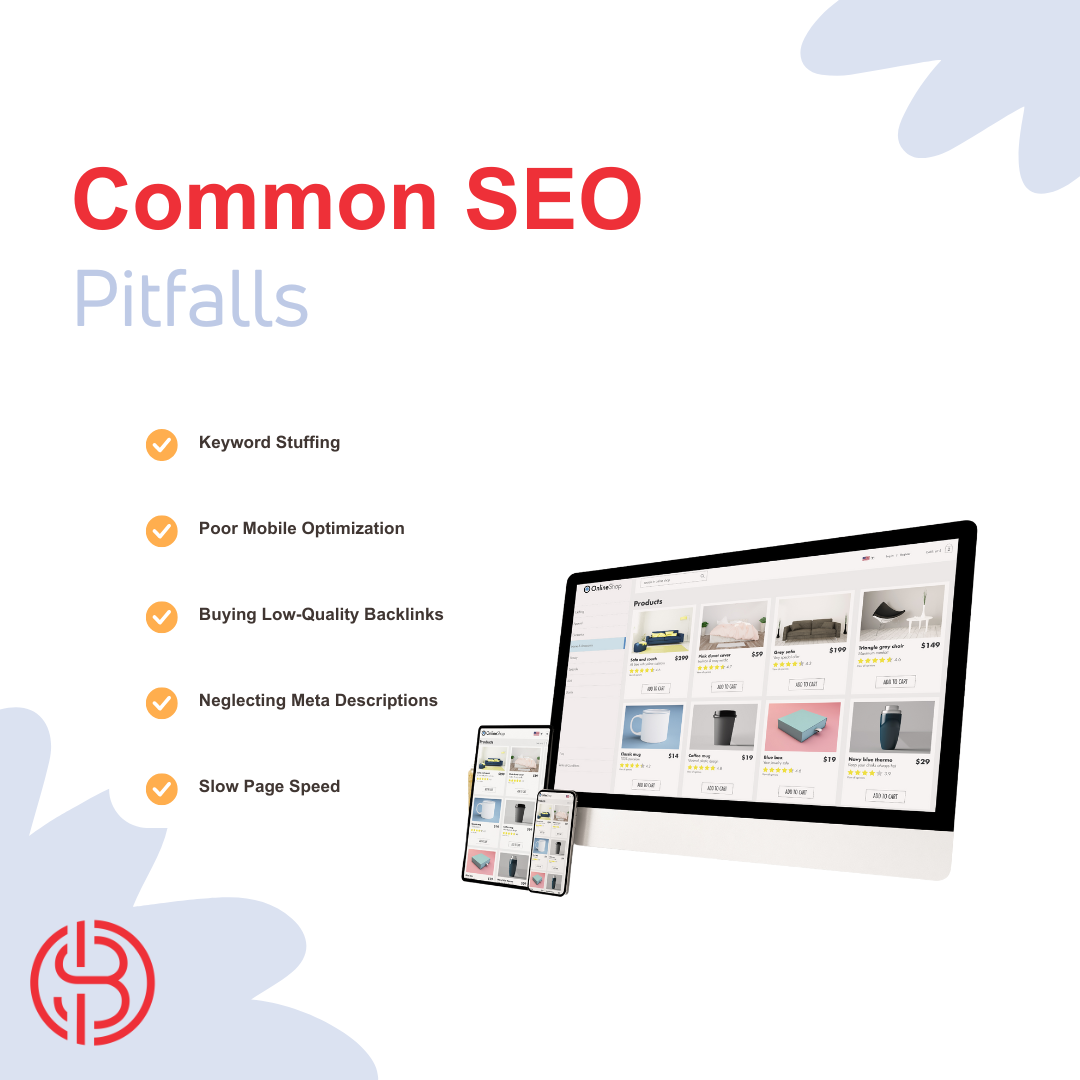
Navigating SEO can be tough. Even marketers who know a lot can make mistakes that hurt their website's performance. Common mistakes include using too many keywords or not paying attention to how well the site works on mobile. Both of these issues can make your website less visible and lower its search ranking.
It is key to recognize these mistakes and find ways to avoid them. By learning from people around you, you can enhance your plans. This way, your website can remain focused on SEO success.
In trying to improve your rankings, you might overdo optimization. This can hurt your SEO strategy instead of helping it. A common mistake is keyword stuffing. This happens when you add too many keywords to your content. It then becomes hard to read and less enjoyable for users.
Search engines, like Google, can easily find websites that fill their content with too many keywords. This practice can make it hard for users to enjoy their experience. It also sends warnings to search engine systems. Because of this, your website's ranking may go down.
A good SEO strategy begins with a great user experience. It’s important to use keywords in your content naturally. Keep your writing clear, easy to read, and valuable for your audience. Try to balance optimization with user-friendliness. By doing this, you can avoid penalties and create content that attracts both search engines and your target audience.
It can be easy to want to take shortcuts for fast results. But using bad SEO techniques can cause serious issues with Google. This can damage your website’s trust and goals for SEO in the long run. These methods go against search engine rules. They try to trick search engine results.
Black-hat techniques are things like buying backlinks, hiding content, and making low-quality content. These tricks might help your site rank higher for a short time. However, search engines will find out and penalize sites that use them. Quality content is always a better choice.
To keep your website strong, pay attention to good SEO practices. Make quality content and earn backlinks in a natural way. It’s also important to provide a positive user experience. Remember that building a strong online presence takes time and work. There are no easy shortcuts to real SEO success.
SEO is always changing. New trends and updates appear all the time. It is important to stay updated with these changes to have a good SEO strategy. This will help you grow successfully in the digital world.
Voice search is becoming really important. Predictive search is also getting stronger. If you know about these new trends, you can change your plans. This will help your website stay visible and competitive in the fast-changing search world.
Voice search is changing the way people look for information online. This is due to AI virtual assistants like Siri, Alexa, and Google Assistant. Now that voice technology is common, businesses need to prepare their websites for voice search. This is important if they want to stay competitive.
Voice search is not the same as text searches. When people use voice search, they usually say longer phrases and ask questions. They do not just type in a few words. This is why you should change your keyword research. You should use long-tail keywords and everyday language. You need to include phrases that sound like questions. This way, you can attract more search traffic.
Think about what people need when they use voice search. They could be searching for local stores, fast answers, or guides. By knowing what users seek and giving clear answers, you can help your website appear more often in voice search results. This will improve the user experience and attract more organic traffic.
Predictive search uses AI and machine learning to guess what people might look for. It does this by examining what they have done before, their browsing history, and common search trends. As search engines improve at understanding what users want, you need to update your SEO strategies. This change will help keep your website visible and ensure good traffic.
Predictive search can change the way people look for information. It can direct them to certain websites or results. To stay updated, you need to understand how the algorithms work. You also need to adjust your keyword research.
To improve your online presence, use long-tail keywords. This helps local SEO and ensures your website content fits what users search for. Pay attention to your website speed and user experience. These factors can change how predictive search functions. When you understand how predictive search affects user behavior, you can make your website better. Doing this will keep you relevant and strong online.
In the fast-changing online world, SEO is still a great way to increase your visibility and be successful. To have SEO success, you must know some key parts of it, such as on-page and off-page strategies. Useful methods like keyword research and building backlinks are very important too. You should also explore advanced techniques like schema markup and use AI for better results. Be careful to avoid issues like over-optimization and black-hat practices. These can harm your SEO strategy. It’s also important to pay attention to new trends, like voice search optimization and predictive search, to keep your SEO efforts ready for the future. Schedule A Free Consultation now to start your journey towards SEO success!
On-page SEO is about improving your website's content and technical features for specific keywords and a better user experience. Off-page SEO focuses on outside factors. This includes link building and using social media to enhance your website's authority and reputation. Both on-page and off-page SEO are key for a good SEO strategy.
SEO is a marketing strategy that requires time to see results. The time it takes can vary based on several factors. These include the level of competition, the age of your website, and the quality of your SEO work. Generally, you will begin to see increases in organic traffic and improved rankings after a few months.
Doing SEO on your own can be successful if you spend the time and understand how it works. Still, getting help from an SEO expert can save you time. It also helps you avoid costly mistakes and teaches you advanced skills. This help is very useful if your website is complex or if you are in a competitive market.
SEO is not a one-time task. It requires ongoing attention and updates to remain effective. You should regularly check how your website is performing. Make changes when Google updates its algorithms. Stay updated on trends in the SEO industry. Adjust your SEO strategy to make improvements.
Yes, SEO is still very important, even with social media marketing growing. Social media can help people notice your brand and get more visitors. However, SEO makes your website appear in organic search results. This way, you can reach more people and build a strong online presence.
Looking at real-life SEO success stories can give you useful ideas and motivation for your SEO strategy. These examples show how businesses have used SEO well to get great results. They highlight the real benefits of good SEO campaigns.
It is key to recognize these mistakes and find ways to avoid them. By learning from people around you, you can enhance your plans. This way, your website can remain focused on SEO success.
Over-optimization: Finding the balance
In trying to improve your rankings, you might overdo optimization. This can hurt your SEO strategy instead of helping it. A common mistake is keyword stuffing. This happens when you add too many keywords to your content. It then becomes hard to read and less enjoyable for users.
Search engines, like Google, can easily find websites that fill their content with too many keywords. This practice can make it hard for users to enjoy their experience. It also sends warnings to search engine systems. Because of this, your website's ranking may go down.
A good SEO strategy begins with a great user experience. It’s important to use keywords in your content naturally. Keep your writing clear, easy to read, and valuable for your audience. Try to balance optimization with user-friendliness. By doing this, you can avoid penalties and create content that attracts both search engines and your target audience.
Avoiding black-hat techniques that can penalize your site
It can be easy to want to take shortcuts for fast results. But using bad SEO techniques can cause serious issues with Google. This can damage your website’s trust and goals for SEO in the long run. These methods go against search engine rules. They try to trick search engine results.
Black-hat techniques are things like buying backlinks, hiding content, and making low-quality content. These tricks might help your site rank higher for a short time. However, search engines will find out and penalize sites that use them. Quality content is always a better choice.
To keep your website strong, pay attention to good SEO practices. Make quality content and earn backlinks in a natural way. It’s also important to provide a positive user experience. Remember that building a strong online presence takes time and work. There are no easy shortcuts to real SEO success.
SEO Trends and Predictions: What's Next?
SEO is always changing. New trends and updates appear all the time. It is important to stay updated with these changes to have a good SEO strategy. This will help you grow successfully in the digital world.
Voice search is becoming really important. Predictive search is also getting stronger. If you know about these new trends, you can change your plans. This will help your website stay visible and competitive in the fast-changing search world.
The increasing importance of voice search optimization
Voice search is changing the way people look for information online. This is due to AI virtual assistants like Siri, Alexa, and Google Assistant. Now that voice technology is common, businesses need to prepare their websites for voice search. This is important if they want to stay competitive.
Voice search is not the same as text searches. When people use voice search, they usually say longer phrases and ask questions. They do not just type in a few words. This is why you should change your keyword research. You should use long-tail keywords and everyday language. You need to include phrases that sound like questions. This way, you can attract more search traffic.
Think about what people need when they use voice search. They could be searching for local stores, fast answers, or guides. By knowing what users seek and giving clear answers, you can help your website appear more often in voice search results. This will improve the user experience and attract more organic traffic.
Predictive search and its impact on SEO strategies
Predictive search uses AI and machine learning to guess what people might look for. It does this by examining what they have done before, their browsing history, and common search trends. As search engines improve at understanding what users want, you need to update your SEO strategies. This change will help keep your website visible and ensure good traffic.
Predictive search can change the way people look for information. It can direct them to certain websites or results. To stay updated, you need to understand how the algorithms work. You also need to adjust your keyword research.
To improve your online presence, use long-tail keywords. This helps local SEO and ensures your website content fits what users search for. Pay attention to your website speed and user experience. These factors can change how predictive search functions. When you understand how predictive search affects user behavior, you can make your website better. Doing this will keep you relevant and strong online.
Frequently Asked Questions
What is the difference between on-page and off-page SEO?
On-page SEO is about improving your website's content and technical features for specific keywords and a better user experience. Off-page SEO focuses on outside factors. This includes link building and using social media to enhance your website's authority and reputation. Both on-page and off-page SEO are key for a good SEO strategy.
How long does it take to see results from SEO?
SEO is a marketing strategy that requires time to see results. The time it takes can vary based on several factors. These include the level of competition, the age of your website, and the quality of your SEO work. Generally, you will begin to see increases in organic traffic and improved rankings after a few months.
Can I do SEO on my own or should I hire a professional?
Doing SEO on your own can be successful if you spend the time and understand how it works. Still, getting help from an SEO expert can save you time. It also helps you avoid costly mistakes and teaches you advanced skills. This help is very useful if your website is complex or if you are in a competitive market.
How often should I update my SEO strategy?
SEO is not a one-time task. It requires ongoing attention and updates to remain effective. You should regularly check how your website is performing. Make changes when Google updates its algorithms. Stay updated on trends in the SEO industry. Adjust your SEO strategy to make improvements.
Is SEO still relevant in the era of social media marketing?
Yes, SEO is still very important, even with social media marketing growing. Social media can help people notice your brand and get more visitors. However, SEO makes your website appear in organic search results. This way, you can reach more people and build a strong online presence.
Real-World SEO Success Stories
Looking at real-life SEO success stories can give you useful ideas and motivation for your SEO strategy. These examples show how businesses have used SEO well to get great results. They highlight the real benefits of good SEO campaigns.
These examples show the variety of businesses that gain from SEO. You can learn from their strategies. By making changes that fit your own business, you can gain helpful ideas and work toward SEO success.
Local SEO is key for small businesses that want to succeed in their community. By enhancing their online visibility in local searches, these businesses can attract more potential customers around them. This effort will lead to increased foot traffic and improved brand awareness.
A key part of local SEO is to claim and enhance your Google Business Profile. Make sure to give accurate business information, promote customer reviews, and keep your profile fresh. This can help you appear in Google’s Local Pack, which shows the best three results for local searches.
Using local keywords on your website can enhance your organic search presence. Getting local citations and building local links are also important. For small businesses, local SEO is essential. It helps attract local customers and thrive in today’s digital environment.
E-commerce businesses need a lot of website traffic to make sales. Good organic search can help them attract potential customers. By using effective SEO practices, e-commerce sites can rank higher in search engines. This will lead to more organic traffic and better conversion rates.
It is very important to write good product descriptions that have keywords. You should find out what users are looking for. Then, you can change product pages to answer common questions. This way, your website will be more relevant. It can help it rank better for certain product searches.
It is important to work on the technical aspects of your website, such as its speed and mobile friendliness. These factors help create a smooth user experience. A good user experience can influence your search engine ranking. Remember that happy customers are more likely to buy from you. Focus on building a user-friendly website that meets their needs and improves their browsing experience.
The world of SEO keeps changing. It’s important to continue learning to stay on top. There are many resources and groups that can help you get better at SEO. They can also help you adjust to changes in digital marketing.
Online courses and certifications can help you improve your SEO knowledge. You can find courses for all skill levels, whether you are a beginner or an expert. These programs provide valuable skills that are key to success in digital marketing.
Joining SEO groups on forums and social media, as well as at industry events, lets you network and share ideas. These groups help you stay updated with the latest trends and news. You can connect with people who have similar interests, ask questions, and learn from experts in the field.
Online SEO courses are great for everyone. If you are new and want to learn the basics, or if you have experience and want to improve, there is a course for you. You can choose from topics like technical SEO, content marketing, and analytics. Pick the courses that fit your career goals.
Getting SEO certifications can show what you know. This can help you stand out for jobs or clients. Also, always learning in SEO is important because things keep changing. You must stay updated to manage algorithm changes and stay strong in the quick-moving digital world.
Joining SEO forums and communities can provide you with support and help you connect with others in the field. They keep you updated in the fast-changing world of search engine optimization. These online groups bring together SEO experts, digital marketers, and website owners. They share tips and ideas and work together to solve the challenges of SEO.
By joining these forums, you can find a lot of valuable knowledge and experience. You can ask questions, get help with problems, and chat with other people who love SEO. This way, you can gain new insights and discover different strategies and best practices in SEO.
SEO communities help you connect with people who have similar interests. You can meet other SEO professionals and learn from those who are more experienced. Plus, you will stay informed about trends in the industry, changes in search engines, and new technologies. These connections can be crucial for your growth in the SEO industry. They can open doors to valuable mentorships, partnerships, and job opportunities. Stay tuned for The Website Lady Podcast by Shelly Bouse.
Small business triumphs with local SEO
Local SEO is key for small businesses that want to succeed in their community. By enhancing their online visibility in local searches, these businesses can attract more potential customers around them. This effort will lead to increased foot traffic and improved brand awareness.
A key part of local SEO is to claim and enhance your Google Business Profile. Make sure to give accurate business information, promote customer reviews, and keep your profile fresh. This can help you appear in Google’s Local Pack, which shows the best three results for local searches.
Using local keywords on your website can enhance your organic search presence. Getting local citations and building local links are also important. For small businesses, local SEO is essential. It helps attract local customers and thrive in today’s digital environment.
E-commerce sites gaining massive traffic through organic search
E-commerce businesses need a lot of website traffic to make sales. Good organic search can help them attract potential customers. By using effective SEO practices, e-commerce sites can rank higher in search engines. This will lead to more organic traffic and better conversion rates.
It is very important to write good product descriptions that have keywords. You should find out what users are looking for. Then, you can change product pages to answer common questions. This way, your website will be more relevant. It can help it rank better for certain product searches.
It is important to work on the technical aspects of your website, such as its speed and mobile friendliness. These factors help create a smooth user experience. A good user experience can influence your search engine ranking. Remember that happy customers are more likely to buy from you. Focus on building a user-friendly website that meets their needs and improves their browsing experience.
Continuing Your SEO Education: Resources and Communities
Online courses and certifications can help you improve your SEO knowledge. You can find courses for all skill levels, whether you are a beginner or an expert. These programs provide valuable skills that are key to success in digital marketing.
- Semrush Academy: This site offers free SEO courses and certifications. You can learn about keyword research, technical SEO, and content marketing.
- Moz Academy: They give detailed SEO training and certifications. It includes both basic and advanced topics.
- Google Digital Garage: This platform has free courses in digital marketing. You can find sessions that cover SEO basics and best practices.
Joining SEO groups on forums and social media, as well as at industry events, lets you network and share ideas. These groups help you stay updated with the latest trends and news. You can connect with people who have similar interests, ask questions, and learn from experts in the field.
Online courses and certifications in SEO
Investing in online courses and SEO certifications shows that you want to grow in your job. It helps you gain respect in the crowded digital marketing field. These programs provide clear steps for learning. They give you important SEO skills and knowledge to advance in your career.Online SEO courses are great for everyone. If you are new and want to learn the basics, or if you have experience and want to improve, there is a course for you. You can choose from topics like technical SEO, content marketing, and analytics. Pick the courses that fit your career goals.
Getting SEO certifications can show what you know. This can help you stand out for jobs or clients. Also, always learning in SEO is important because things keep changing. You must stay updated to manage algorithm changes and stay strong in the quick-moving digital world.
Joining SEO forums and communities for ongoing support
Joining SEO forums and communities can provide you with support and help you connect with others in the field. They keep you updated in the fast-changing world of search engine optimization. These online groups bring together SEO experts, digital marketers, and website owners. They share tips and ideas and work together to solve the challenges of SEO.
By joining these forums, you can find a lot of valuable knowledge and experience. You can ask questions, get help with problems, and chat with other people who love SEO. This way, you can gain new insights and discover different strategies and best practices in SEO.
SEO communities help you connect with people who have similar interests. You can meet other SEO professionals and learn from those who are more experienced. Plus, you will stay informed about trends in the industry, changes in search engines, and new technologies. These connections can be crucial for your growth in the SEO industry. They can open doors to valuable mentorships, partnerships, and job opportunities. Stay tuned for The Website Lady Podcast by Shelly Bouse.






